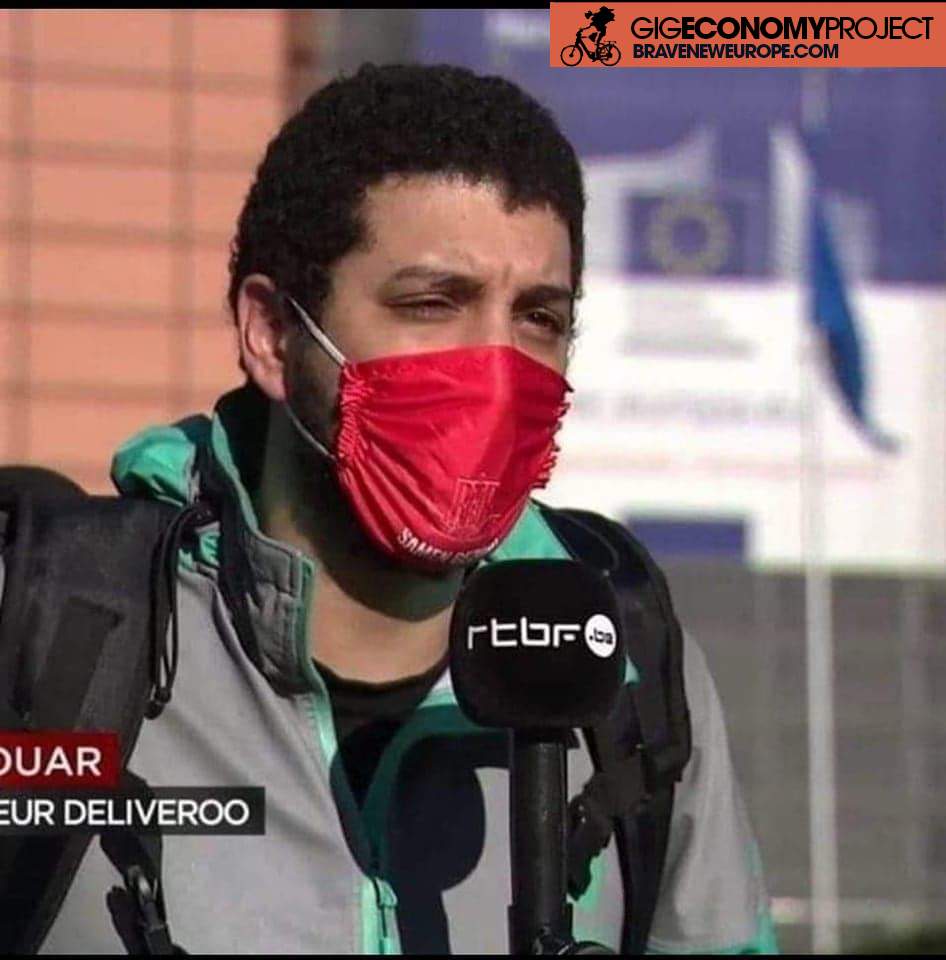A veteran of the gig economy, Sebban Anuar has worked for multiple platforms in Brussels, including Deliveroo for the past six years. He tells the Gig Economy Project about the trials and tribulations of a precarious work life.

The Gig Economy Project, led by Ben Wray, was initiated by BRAVE NEW EUROPE enabling us to provide analysis, updates, ideas, and reports from all across Europe on the Gig Economy. If you have information or ideas to share, please contact Ben on GEP@Braveneweurope.com.
This series of articles concerning the Gig Economy in the EU is made possible thanks to the generous support of the Andrew Wainwright Reform Trust.

Sebban Anuar is about as experienced as it gets when it comes to working in the gig economy. Aged 30, he has worked for the past six years as an UberX limousine driver, a Sixt driver, a Bpost postman, an Uber Eats and a Deliveroo courier. He began with Deliveroo six years ago and is still riding for the British-owned firm today.
Brought up in Woluwe-Saint-Lambert just outside of Brussels, Sebban has known little work other than pounding the streets of the Belgian capital with a phone and an app, never certain of what is coming next.
“I had a hard time finding a stable job with a real contract; I was not so lucky!” He says. “I’m looking forward to find something stable to take an apartment.”
He describes the experience of working in the gig economy for over half a decade in brutal terms.
“Lack of means, big budgetary worries and the obligation to accept a dictatorship in terms of remuneration. I feel abandoned in the jungle.”
The feeling of being “abandoned” partly comes from the inaccessibility of the platforms when something goes wrong.
“When something happens to us on the road, we have no one to rely on. Uber Eats and Deliveroo are, in my eyes, ghost apps that only think about lining their pockets on the backs of precarious workers. We are not safe like any worker should be.
“They only respond to deliverers when there is a problem with the order. Ultimately, if an order is dropped, we don’t get paid. One delivery person recently explained to me that they refund the order with the courier’s money.”
The inflation crisis has ramped up the pressure on food delivery couriers, as costs rise while pay stagnates. Sebban says the crisis has highlighted the need for a regular salary, rather than continuing to be exposed to the vagaries of the algorithm.
“All the prices went up and we still couldn’t get a regular salary. We had to save up to buy used equipment. We are paid just €0.53-€4.95 per order and they take 10.7% of our online tips.”
READ MORE: Organising gig workers in Belgium: Interview with Martin Willems of ‘United Freelancers’
A regular salary from Deliveroo is not likely to be coming any time soon. The company has been one of the most vociferous voices among food delivery platforms opposed to employment status, and whereas Deliveroo is losing in the majority of courts across Europe, a Belgian judge found in December that couriers of the company were self-employed, not employees. Anuar’s union, the United Freelancers section of the ACV-CSC union, which brought the case forward is now taking it to an appeals court.
“I’m not happy with the verdict because I think we are fake self-employed and that there is indeed a subordination link between the platform and the deliverers, since the platforms impose prices on the deliverers and can de-activate whoever they want,” he says.
Deliveroo appears to have taken some confidence from that court ruling. Despite falling demand, the Amazon part-owned company is expanding into new Belgian cities, at the same time as it pulls out of nearby Netherlands all together. Anuar is in for a long fight, but he has been fighting ever since he entered the world of gig work.
“I decided to protest from the start simply because I couldn’t find anyone to turn to,” he says. “I went to Uber’s headquarters and started protesting, then I started posting on Facebook and that’s where I started developing my network.
“I discovered the United Freelancers, which introduced me to other people and we founded the Couriers Collective and motivated several couriers to join our cause. Now I consider myself a militant of the couriers in struggle. I say that ‘if we do not move, our fall will be inevitable’.”
Anuar was in attendance at the ‘Alternatives to Uberisation’ conference on 8 September, which brought together platform workers from at least 15 countries to discuss ideas and strategies.

“It allowed us to meet activists from all over the world and exchange in political terms about the failures of these companies. It opens our eyes to the difficulties of other workers as well as to the social and economic issues. We also had the opportunity to speak in the European Parliament, so I think it’s a good sign. The struggle continues, and behind every struggle there is a fight.”
The Couriers Collective and the United Freelancers are organising a General Assembly for Brussels’ couriers on 21 September, ahead of a mobilisation on the 18 October. Anuar is also involved in setting-up a ‘House of Couriers’ in Brussels; a place where couriers can rest, wash, meet one another and organise.
“This will be a friendly place where couriers can meet, talk over coffee and defend their interests,” he says. “It’s useful if we can mobilise as many couriers as possible for the right cause.”
Anuar’s organising now extends beyond the couriers’ struggle. He has become an activist, currently engaged in a campaign to defend unemployment centres in the Belgian capital, and has joined the Workers’ Party of Belgium, a leftist party with 17 Deputies in the Belgian Chamber of Representatives and Senate.
Having been interested in joining the Police or the Army as a youngster, Anuar’s years of struggle have given him a different sense of ambition.
“I hope to become a Deputy to continue to shake this overly exploitative system!”
To sign up to the Gig Economy Project’s weekly newsletter, which provides up-to-date analysis and reports on everything that’s happening in the gig economy in Europe, leave your email here.
BRAVE NEW EUROPE has begun its Fundraising
Support us and become part of a media that takes responsibility for society
BRAVE NEW EUROPE is a not-for-profit educational platform for economics, politics, and climate change that brings authors at the cutting edge of progressive thought together with activists and others with articles like this. If you would like to support our work and want to see more writing free of state or corporate media bias and free of charge. To maintain the impetus and impartiality we need fresh funds every month. Three hundred donors, giving £5 or 5 euros a month would bring us close to £1,500 monthly, which is enough to keep us ticking over. Please donate here.


Be the first to comment